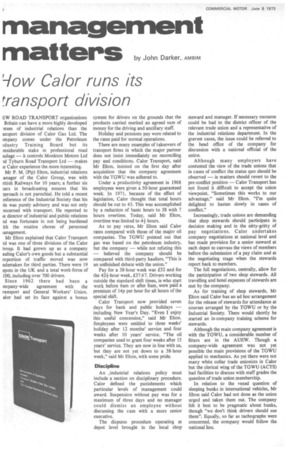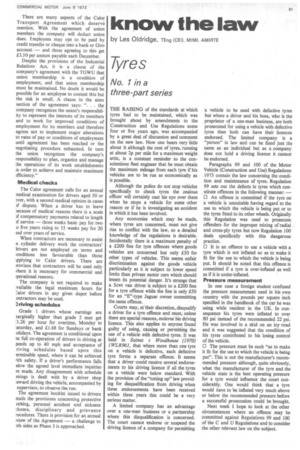rrianagement
Page 82

Page 83

If you've noticed an error in this article please click here to report it so we can fix it.
rnatters by John Darker, AMBIM
'ow Calor runs its ransport divLsion
EW ROAD TRANSPORT organizations Britain can have a more highly developed stem of industrial relations than the ansport division of Calor Gas Ltd. The ■ mpany comes under the Petroleum idustry Training Board but its msiderable stake in professional road 'Wage — it controls Monkton Motors Ltd Id Tyburn Road Transport Ltd — makes le Calor experience the more interesting. Mr P. M. (Pip) Elton, industrial relations .anager of the Calor Group, was with ritish Railways for 10 years; a further six :ars in broadcasting ensures that his )proach is not parochial. He told a recent mference of the Industrial Society that his le was purely advisory and was not only mcerned with transport. He reported to Le director of industrial and public relations ad was fortunate in not being burdened ith the routine chores of personnel ranagement.
Mr Elton explained that Calor Transport td was one of three divisions of the Calor iroup. It had grown up as a company auling Calor's own goods but a substantial roportion of traffic moved was pow ndertaken for third parties. There were 19 epots in the UK and a total work-force of 100, including over 700 drivers.
Since 1962 there had been a nnpany-wide agreement with the ransport and General Workers' Union. alor had set its face against a bonus system for drivers on the grounds that the products carried merited an agreed sum of money for the driving and ancillary staff.
Holiday and pensions pay were related to the rates paid for normal operations.
There are many examples of takeovers of transport firms in which the major partner does not insist immediately on reconciling pay and conditions. Calor Transport, said Mr Elton, insisted on the first day after acquisition that the company agreement with the TGWU was adhered to.
Under a productivity agreement in 1968 employees were given a 50-hour guaranteed week. In 1971, because of the effect of legislation, Calor thought that total hours should be cut to 45. This was accomplished by a reduction of basic hours to 38 with 7 hours overtime. Today, said Mr Elton, overtime was limited to 4+ hours.
As to pay rates, Mr Elton said Calor rates compared with those of the major oil companies. The TGWU pointed out that gas was based on the petroleum industry, but the company — while not refuting this — believed the company should be compared with third-party hauliers. "This is an unfinished debate with the union."
Pay for a 38-hour week was £32 and for the 424-hour week, £37.67. Drivers working outside the standard shift times, ie who start work before 6am or after 8am, were paid a premium of 14p per hour for all hours of the special shift.
Calor Transport now provided seven days for bank and public holidays — including New Year's Day. "Even I enjoy this useful concession," said Mr Elton. Employees were entitled to three weeks' holiday after 12 months' service and four weeks after 10 years' service. "The oil companies used to grant four weeks after 15 years' service. They are now in line with us, but they are not yet down to a 38-hour week," said Mr Elton, with some pride.
Discipline
An ,industrial relations policy must include a section on disciplinary procedure. Calor defined the punishments which particular levels of management could award. Suspension without pay was for a maximum of three days and no manager could dismiss an employee without discussing the case with a more senior executive.
The disputes procedure operating at depot level brought in the local shop steward and manager. If necessary recourse could be had to the district officer of the relevant trade union and a representative of the industrial relations department. In the gravest cases, the issue could be referred to the head office of the company for discussion with a national official of the union.
Although many employers have contested the view of the trade unions that in cases of conflict the status quo should be observed — ie matters should revert to the pre-conflict position — Calor Transport has not found it difficult to accept the union viewpoint. "Sometimes this works to our advantage," said Mr Elton. "I'm quite delighted to hasten slowly in cases of conflict."
Increasingly, trade unions are demanding that shop stewards should participate in decision making and in the nitty-gritty of pay negotiations. Calor undertakes company negotiations at national level and has made provision for a senior steward at each depot to canvass the views of members before the submission of a pay claim and at the negotiating stage when the stewards report back to members.
The full negotiations, centrally, allow for the participation of two shop stewards. All travelling and hotel expenses of stewards are met by the company.
As for training of shop stewards, Mr Elton said Calor has an ad hoc arrangement for the release of stewards for attendance at courses arranged by the TGWU or by the Industrial Society. There would shortly be started an in-company training scheme for stewards.
Although the main company agreement is with the TGWU, a considerable number of fitters are in the AUEW. Though a company-wide agreement was not yet possible the main provisions of the TGWU applied to mechanics. As yet there were not many white collar trade unionists in Calor but the clerical wing of the TGWU (ACTS) had facilities to discuss with staff grades the question of trade union membership.
In relation to the vexed question of sleeping bunks in international vehicles, Mr Elton said Calor had not done as the union urged and taken them out. The company felt it best to be pragmatic about bunks, though "we don't think drivers should use them". Equally, so far as tachographs were concerned, the company would follow the national line. There are many aspects of the Calor Transport Agreement which deserve mention. With the agreement of union members the company will deduct union dues. Employees may opt to be paid by credit transfer or cheque into a bank or Giro account — and those agreeing to this get £3.50 per annum payable each December.
Despite the provisions of the Industrial Relations Act, it is a clause of the company's agreement with the TGWU that union membership is a condition of employment, and that union membership must be maintained. No doubt it would be possible for an amployee to contest this but the risk is small. A clause in the aims section of the agreement says: ". . . the company recognizes the union's responsibility to represent the interests of its members and to work for improved conditions of employment for its members and therefore agrees not to implement major alterations to rates of pay or conditions of employment until agreement has been reached or the negotiating procedure exhausted. In turn the union recognizes the company's responsibility to plan, organize and manage the operations of its work establishments in order to achieve and maintain maximum efficiency."
Medical checks
The Calor agreement calls for an annual medical examination for drivers aged 50 or wer, with a second medical opinion in cases if dispute. When a driver has to leave Jecause of medical reasons there is a scale if compensatory payments related to length if service — three weeks basic pay for two o five years rising to 15 weeks pay for 20 ind over years of service.
When contractors are necessary to assist n cylinder delivery work the contractors' !rivers are not employed on terms and :onditions less favourable than those tpplying to Calor drivers. There are irovisos that contractors will be used only vhere it is necessary for commercial and )perational reasons.
The company is not required to make Lvailable the legal maximum hours for :alor drivers in any given depot before ontractors may be used.
Driving schedules
Grade 1 drivers whose earnings are targinally higher than grade 2 men get :1.26 per hour for overtime, Monday to Iaturday, and £1.68 for Sundays or bank olidays. The agreement is conditional upon he full co-operation of drivers in driving at peeds up to 40 mph and acceptance of riving schedules based upon this ermissible speed, where it can be achieved rith safety. If a driver's performance falls elow the agreed level immediate inquiries re made. Any disagreement with schedule mings is dealt with by a driver shop teward driving the vehicle, accompanied by supervisor, to observe the run.
The agreement booklet issued to drivers nails the provisions concerning protective othing, personal accident and sickness :heme, disciplinary and grievance rocethres. There is provision for an annual :view of the Agreement — a challenge to ith sides as Phase 3 is approached.












































































































































